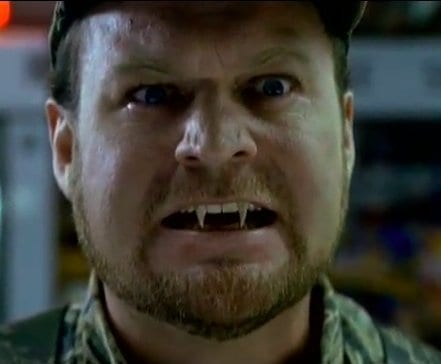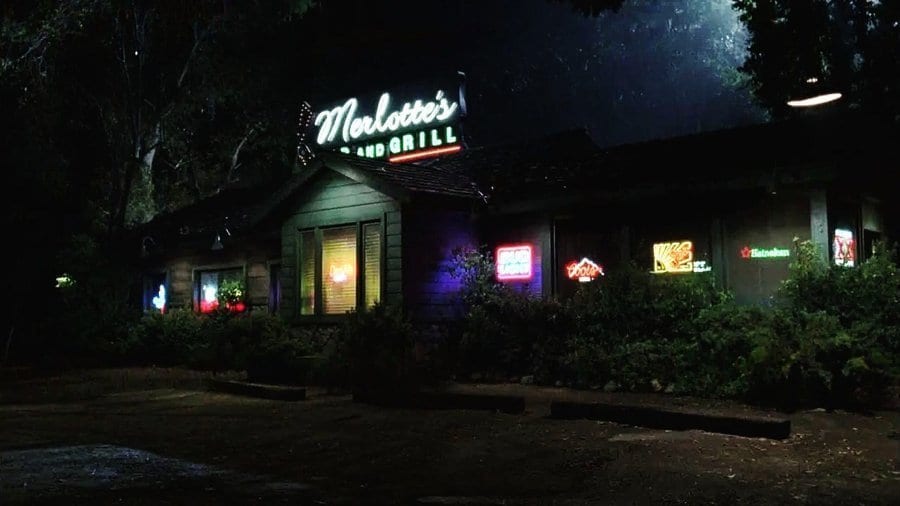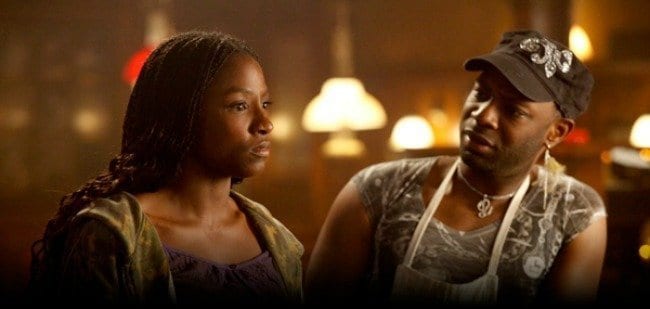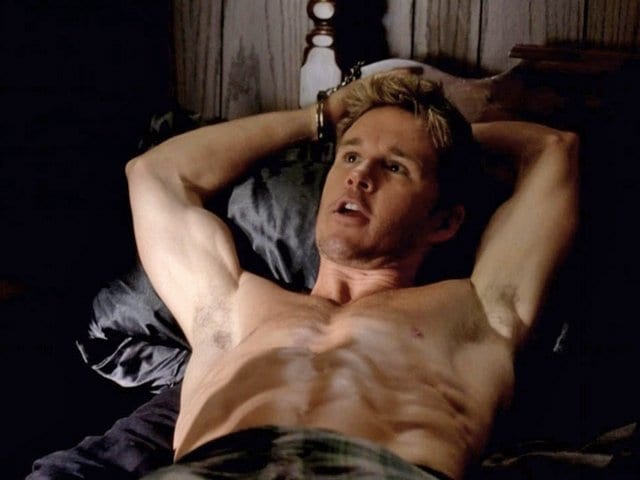“Strange Love,” the pilot episode of HBO’s smash gothic vampire romance series True Blood, premiered way back in September of 2008. The Bush/Cheney presidency was in its last gasps, the global economy was on the brink of collapse, the U.S. and its allies were bogged down in two seemingly endless wars in the Middle East, the country was deciding whether it wanted John McCain or Barack Obama to be the next leader of the free world, and the fight for marriage equality was still four years away from a Supreme Court ruling stating that homosexuals were afforded the same rights as heterosexuals couples. The series was the network’s welcome return to Alan Ball, who already had one smash HBO series with Six Feet Under and an Academy Award for his American Beauty screenplay under his belt.
Based on Charlaine Harris’s bestselling series of Southern vampire novels (called the Sookie Stackhouse series) Alan Ball’s True Blood was to be a show that mirrored the chaotic, uncertain, and often dangerous world that was our own. As the show stretched out over its seven-season run, and with Ball leaving entirely after the show’s third season, True Blood would quickly devolve into strictly “guilty pleasure” viewing. It definitely maintained the sex, pulp, violence, and fantasy elements that Alan Ball tantalizingly brought to the show from the start, but all of the social commentary got lost somewhere along the way. By the last couple seasons, it was essentially a sex-filled hard-R version of Twilight.
Looking back to that September Sunday night when “Strange Love” first hit the airwaves, the episode managed to encapsulate and elevate the material in a way that the series as a whole never did, especially in its later seasons. The pilot starts off with a bang of a cold open. In a David-Lynch-like moment, the camera is positioned inside of a fast moving SUV at night, headlights lighting up the darkness on an old, winding road. Inside the vehicle is a young college-aged couple, hopped up on each other as they fool around, cruising down the road, and heading out to party for the night. The car slams to a screeching halt when they notice a convenience store’s billboard reading “WE HAVE TRU BLOOD.” For those unfamiliar with the series, the drink Tru Blood is a synthetic human blood substitute manufactured by the Japanese and marketed to vampires worldwide, allowing them to “come out of the coffin” as the show puts it.
They both excitedly hop out of the vehicle and run inside to see if they can procure any “V,” which is short for vampire blood. In the True Blood universe, V can best be described as the most potent narcotic on Earth to human beings. It is highly addictive and just a drop seems to act as a combination of speed and ecstasy, making it extremely popular with the late-night party crowd. Inside the convenience store, the rest of the cold open plays out in such spectacular fashion, perfectly blending the right amount of exposition with a classic moment of subversion of expectations. It is irreverent, darkly funny, and just a little bit scary, all at the same time.
Inside the convenience store, the worker sits behind the counter with his feet propped up, watching the TV. He is dressed head to toe in gothic fashion, wearing a black shirt, ripped jeans, and black boots. He has long, dyed black hair, pale white skin, and is sporting a necklace emblazoned with Satanic imagery. His fingers and hands are adorned with skull rings and steel-tipped black bracelets. If there ever was an individual that screamed “I am a vampire” on a show about vampires, this store clerk was it. As the two giggling co-eds from the car enter the store, the clerk is watching a fictitious episode of HBO’s Real Time With Bill Maher, wherein Bill Maher is having a one-on-one conversation with Nan Flanagan, the head of the American Vampire Federation, who is there speaking on behalf of a proposed Vampire Rights Amendment that her organization is hoping to lobby through Congress. The argument is pretty simple: since the invention and mass distribution of Tru Blood, vampires do not pose a threat to human beings because they have no need to feed off of them. Flanagan goes even further by pointing Maher’s question about the exploitative, murderous nature of vampires back at humans.
What is so great about this exchange between Maher and Flanagan is it quickly lets the audience know, without too much unnecessary dialogue, the broader world that they are entering. Letting the audience enter said world through a television show that they already know (and perhaps even regularly watch) helps establish a willing suspension of disbelief going forward. It also sets up one of those pesky mirrors to our own world. As an analogy, the “vampire as homosexual” has always been problematic; nevertheless it has been used countless times throughout the course of horror films and literature. Flanagan and Maher’s conversation evokes many real-world debates from the time period on actual episodes of Real Time with Bill Maher between proponents of marriage equality and those that sought to keep the LGBTQ+ community “in the closet.” Ball is asking the audience right from the get-go to identify with something that many may have otherwise felt uncomfortable with.
The two college kids run into the store like tourists in a foreign country, excitedly asking the foreboding store clerk if he ever gets any “vamps” in his store and if they could perhaps buy some V for their night out. As the exchange between the co-eds and the vampiric employee begins, a stereotypical-looking middle-aged Southern man decked out all in camouflage and a baseball cap sporting the Confederate flag, walks in and heads back to the beer section. Meanwhile at the front of the store, the goth, sporting a thick eastern European accent, scares the couple by telling them that he is himself a vampire before dropping the accent and letting them know that he was “just f*cking with them.”
At this point, the redneck has approached the store counter with a six-pack under his arm, impatiently waiting for the exchange to end. He then tells the young man that they should both leave when they inquire again about getting some vampire blood from the store clerk. The entitled young man blatantly tells the redneck that no one there “gives a f*ck what he has to say” and then proceeds to make his final mistake by simply saying “fuck you.” The response goes down as one of my favorite darkly comedic moments on television. Before flashing his fangs, the man smiles at the co-eds, wild-eyed, saying with a thick accent, “F*ck me? Nah boy, I’ll f*ck you. I’ll f*ck ya, and then I’ll eat ya.” Of course, the couple flees the store, terrified, leaving the redneck to slam a six-pack of Tru Blood down onto the counter, while telling the fake vampire store clerk that if he ever pretends to be a vampire again, he will be killed. “Oh, and y’all have a nice night now, ya’ hear?” The show cuts to black and the credits roll.

This exchange is such a perfect moment of subversion on the part of Alan Ball, creating one of the most effective openings in modern television history. I cannot think of a better way to get audiences to immediately throw out everything they think they know about vampires. There is no Lestat here. All vampires are not charming, romantic, Eastern European metrosexuals. They are not hanging from the ceiling, listening to Bauhaus, and living in fog-enshrouded castles. They do not constantly dress in black (though some of them might). No, from the get-go True Blood was very good about treating vampires as not that much different than the humans they interact with. If an individual was a NASCAR-loving, camouflage-sporting, Merle Haggard-listening, proud son of the South when he was “turned,” then he was probably not going to suddenly start spouting Rimbaud and Blake while attending productions of La Boehme at the opera. Just like the humans in and around the fictional town of Bon Temps, Louisiana, vampires were flesh-and-blood creatures with actual personalities that were all too human.
If the cold open of the pilot “Strange Love” was the first punch to subvert audience expectations, the knockout hook came immediately after in the unforgettable opening title sequence scored by Jace Everett’s “Bad Things”: a song that became synonymous with True Blood itself. Over several quick cuts splicing together a Holy Roller church service, strippers and drunk bar patrons grinding in a dirty beer hall, insects and animals coming to life and decaying simultaneously, little boys chewing hungrily on raw meat, a neon sign reading “god hates fangs,” and a creek water baptism, the main title credits set the tone perfectly for the hour of television that is to follow. This will be a show about sex and vampires, but this will also be a show about living in the American South and the dichotomies of small-town Bible-belt USA. It is not a mistake that the credits go from religious iconography to sex to religion to violence to religion to sex and back again. This will be a show about monsters, alright—but which kind? And who exactly are they? The answers are not always as clear as you might think in Bon Temps, Louisiana and the world of True Blood.
After setting up the basics, “Strange Love” wastes no time diving right in to setting up all the players on the board. Most of the episode deftly takes place in one location, Merlotte’s Bar and Grill, and the events unfold over a roughly 24-hour period, beginning late at night and ending sometime during the following day. It is at Merlotte’s—seemingly the only place to eat, drink, dance, and meet people in Bon Temps—that the audience meets its heroine, Sookie Stackhouse (Anna Paquin). As Sookie herself will soon tell vampire Bill Compton (Stephen Moyer) upon first meeting him, she sees herself as just a waitress. That’s right. Sookie Stackhouse is just a small-town girl living in small-town Louisiana, trying to figure life out (except she really is anything but ordinary). Right off the bat, Sookie is seen waiting tables at Merlotte’s on a crowded night, trying her best to refrain from blatantly reading every patron’s mind. The sequence, like the cold open, is very effective by not using too much unnecessary exposition to tell the audience that Sookie is telepathic.

In one of the pilot’s best and funniest moments, Sookie walks through her crowded section at Merlotte’s, full of Bon Temps residents, and hears a variety of thoughts coming from inside each patron’s head. There is the Christian praying to Jesus that this be his one and only beer for the night, a wife thinking about the kind of disgusting and delightful sexual act her husband had her perform last night, and the teen boy pleading internally to get out of the dying town of Bon Temps. And then in walks vampire Bill Compton, setting off an instant spark that will change not only the lives of Sookie and Bill themselves but everyone around them in ways too ridiculous to fathom.
Love at first bite? Sookie (Anna Paquin) saves vampire Bill Compton (Steven Moyer).Before all that happens and this universe becomes way too bloated, let’s stick to the coziness of the confined mystery and intrigue in “Strange Love.” Merlotte’s serves as a place for the majority of the characters to be introduced to the audience. Bon Temps is an extremely small town in Louisiana’s (fictional) Renard parish and there are just not that many places for all the townies to work. A good portion of the cast portray characters that work at Merlotte’s and much of the action in the episode stays close to the bar-restaurant that doubles as home base. The major players include Sam Merlotte (Sam Trammell), the owner of the local eatery/watering hole who has an almost obsessive crush on Sookie (and who may or may not be a shapeshifting dog).
More interesting are the flamboyant and openly gay Merlotte’s cook, Lafayette (Nelsan Ellis), and Sookie’s best friend since childhood, Tara (Rutina Wesley). When True Blood first aired over a decade ago, seeing two strong independent black characters on a premium cable genre show felt like an absolute breath of fresh air. Both characters are proudly black but neither felt like an imitation of blackness. These characters felt authentic. They felt like real people. It was characters like Lafayette and Tara that could always be counted on to anchor any situation in reality because the audience knew and related to these characters. Anyone that has ever worked in a restaurant or tended bar knew a Lafayette and a Tara, and many watching probably were their workplace’s Lafayette or Tara.

The sadly deceased Nelsan Ellis plays Lafayette (as written by Ball) as not just poking fun at the South, but also people’s notions about the South itself. Its prejudices are often blunt and obvious but often times more complex, nuanced, and woven into everyday life. This is the life that Lafayette, a proud gay black Southern man, was thrust into. His brash personality made him a hit with the waitresses at Merlotte’s and a terror to any bigoted redneck that got in his way. The pilot introduces him the best way that it can: by showing what he does. There is a delightful fly-on-the-wall feeling watching Lafayette cooking and making sex jokes at work with the waitresses.
Rutina Wesley’s Tara, on the other hand, is all tough exterior. She is introduced quitting a job and making quite a scene while doing so. The scene is played for laughs but the writing is so good that the audience can immediately identify with Tara. Everyone that has ever worked retail has had a moment where they just wanted to snap, scream “fuck it,” slap their manager, and walk out. Tara is the friend you have who actually did that. She is alive and loud and an absolute force to be reckoned with, but she is also very vulnerable and (outside of Sookie) she has trouble trusting anyone.
These supporting characters, along with fellow Merlotte’s waitress Arlene (Carrie Preston), are what help anchor True Blood in the years ahead as it drifted farther and farther down the rabbit hole of the supernatural. In “Strange Love,” they just come off as the colorful people that you probably grew up with yourself—which is just another way the episode draws you in. These people are all real and interesting so the audience wants to spend more time getting to know them.
At its start, regardless of where the series ended up, True Blood was a pulpy whodunit filled with sex, booze, and hard drugs mixed with a twist of social commentary. The Vampire Rights Amendment and people’s aversion to it was most certainly Alan Ball’s way to talk about people’s fear of sexuality and marriage equality (even if the comparison does not quite work for me since there is actually something to fear from a vampire as opposed to affording same-sex couples the same legal rights as straight couples). Nevertheless, the vampires may be no worse or better than humans in the world of True Blood, so maybe people should be more afraid of each other.
Back at Merlotte’s, Sookie Stackhouse is completely awestruck at the arrival of Bon Temps’s first known vampire, Bill Compton. Bill is a son of the South who fought for the Confederacy and was “turned” during the Civil War, making him 173 years old when the audience first lays eyes on him. Nathan Barr’s score completely takes over the scene when Bill and Sookie first lock eyes in hauntingly beautiful Southern Gothic style. It is a forbidden love affair from the start and both actors sell it without saying a single word.
Vampire Bill needs to be more careful when he goes out, however. Calling back to the college kids wanting V to get high at the beginning of the episode, Bill is lured away from just trying to sit and fit in quietly at Merlotte’s by local criminals (the Rattrays). They join Bill at his booth inside Merlotte’s to chat him up, all the while planning on kidnapping him to drain his blood and sell it for thousands of dollars. Luckily Sookie is their waitress and she hears their thoughts just in time to get to Bill in the parking lot and save the day, but by doing so she reveals to Bill that she is something more than human. When confronting the Rattrays, Sookie wields a chain that seems to fly out of her hands, wrap itself around Mack Rattray’s throat, and squeeze all by itself.
While all this happening across town, Sookie’s older brother Jason Stackhouse (Ryan Kwanten) is having a late-night rendezvous with local “Fangbanger” Maudette Pickens. (Fangbanger is a less-than-affectionate term the series uses to describe women who sleep with vampires.) Upon discovering vampire bites on her thigh, Jason insists on hearing all the seedy details of Maudette’s sexual encounter with a vampire. She eventually admits to having filmed the encounter and they watch it before Jason and Maudette reenact the rough sex she’d had with the vampire. Maudette forgets to tell Jason that she is taping their sexual encounter as well, so the audience can just hope that little fact does not come back to harm anyone by the end of the hour.

Jason and Maudette’s sex scene is the first of many explicit sex scenes that the series became known for. The scene in “Strange Love” serves more than just pretty naked bodies on screen together. Through Maudette’s past sex with the vampire and Jason’s initial apprehension turned into sexual intrigue, Alan Ball points a finger at America’s own strange “behind closed doors” attitude toward sex. At first, Jason looks down on Maudette for sleeping with a vampire but it doesn’t take long before he is copying the way the vampire had sex with her (as best he can as a human). The scene has a voyeuristic quality to it, as if the audience is seeing that “bad” part of sex that no one is supposed to talk about.
After a night of sex-filled nightmares of vampire Bill, Sookie awakens the next morning at the family home she shares with her grandmother. She is met by her brother Jason who shows up for breakfast before heading to the road construction site where he works. While they are goofing around eating, their grandmother gets a phone call and informs them that Maudette Pickens was found dead, strangled to death in her apartment. Now the central mystery of the show has been set up in its classic noir fashion, body count and all.
Of course, Jason is the prime suspect. He was seen on tape having rough sex with Maudette hours before she was found strangled. The laid back Sheriff Dearborne and angry bulldog Deputy Andy Bellefleur (Chris Bauer) arrest Jason right from his construction crew job and it does not take long for his buddies from work to make sure the news gets back to Sookie at Merlotte’s that evening. Sookie explodes on everyone for keeping the news from her all day and then sees vampire Bill sitting back in her section. As she talks to him excitedly the audience gets a taste of just how stylistic True Blood can be when Bill Compton proclaims that everyone in the entire bar is staring them down. Sure enough, as the camera pans around the entirety of Merlotte’s, one can hear a pin drop. The sight of everyone gawking at the strange girl flirting openly with a vampire speaks to social taboos in our world dating back at least to the civil rights era. Both Sookie and Bill are outsiders trying to fit in to a world they were born into, but not necessarily entirely comfortable with being a part of. “Strange Love” ends on a cliffhanger when Bill and Sookie plan to meet outside of Merlotte’s at the end of her shift at 1:30 in the morning. Sookie is attacked viciously by the Rattrays, who are out for revenge against her for thwarting their attempt to drain and sell Bill’s blood.
As True Blood went on over the next seven years, the show kept the sex, drugs, and violence that is promised from the very start in the pilot, but somewhere along the way it got lost in a sea of never-ending reveals of different ridiculous new supernatural creatures and elements. The characters became largely parodies of themselves and alliances were constantly shifting in the easiest, sometimes downright lazy ways. Was the series always fun? Definitely. This writer, despite my complaints, was proud to be “true to the end,” but was mostly laughing at myself by the time the show heaved its way across the finish line. Thinking back to this perfect start, the show never really got better than this pilot. Everything it ever did well, Alan Ball wrote and directed in this hour. It was often duplicated but never bested. “Strange Love” had the mystery, the danger, the sexuality, the vampires, and characters who were good at constantly vamping. The idea behind the show was a solid social commentary on sexuality and marriage equality and a condemnation of puritan moralism. “Strange Love” celebrated the South while burning it down and although the series never quite rose to the potential of its pilot, it is still one of the more worthy additions in the golden age of television.

